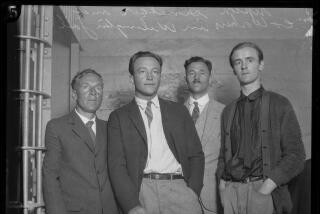Freedom fight
- Share via
ON WEDNESDAY, New York Gov. George Pataki officially scuttled plans for an ambitious International Freedom Center to be built at Ground Zero in Lower Manhattan. And though he was no doubt motivated by all the wrong impulses -- most notably, a politician’s phobia of angering his own base constituencies -- his decision was, by sheer chance, the right one.
The movement against the Freedom Center was originally ginned up by some of the 9/11 victims’ families and quickly amplified by the right side of the blogosphere. Conservatives argued not only that the glitzy center would overshadow the site’s more modest and stark monument to the dead but that some of the center’s consultants -- lefty history professors and civil libertarians -- would use it as some sort of politically correct platform of anti-American self-flagellation.
At one point, Pataki even insisted on an “absolute guarantee” that the center wouldn’t do anything to “denigrate America.” Some “freedom” center that would be, huh?
But there is a good reason to scrap the center: In our current popular and political culture, the very word “freedom” has so many different meanings to so many people that it has ceased to have much collective meaning.
To paraphrase (or bastardize) the Kris Kristofferson song, freedom’s just another word we use when we have nothing else to say. It can alternately be used to describe our right to free speech or the availability of 53 types of toilet paper. Or the right to sit in the middle of the street, or the right not to have our day disrupted by such public disobedience.
To others, freedom means providing all with the basics of life, while some are certain it guarantees the right to gain as much personal advantage as possible, even at the expense of the most disadvantaged.
Early on, President Bush made it seem that freedom was the central issue in the 9/11 attacks. Speaking of Al Qaeda members just nine days after the attacks, he said, “They hate our freedoms: our freedom of religion, our freedom of speech, our freedom to vote and assemble and disagree with each other.”
But that’s baloney. The attacks on the World Trade Center had nothing to do with our freedoms, and there’s no compelling reason to forever monumentalize such a mistaken notion. In his fundamentalist world view, Osama bin Laden hates us because of his own delusional religious views, which he then links to our foreign policy. The attack would have come just the same if the Constitution and domestic rule of law had been abolished years before. Certainly when Bin Laden launches attacks in his Saudi homeland, one totally bereft of democratic liberties, any concept of freedom is absent.
The reason for the attacks of 9/11 and their myriad implications are something we as a society will be sorting out for years to come. To see that, you need go no further than the controversy that erupted around the Freedom Center, in which, for some, the notion of freedom apparently does not extend even to a dissenting view of mainstream policies. Nor can we yet agree as a society if taking away the liberty of others with no due process, or submitting some of those same people to torture, contradicts our oft-repeated pledges to the universal principles of freedom.
Bush’s eagerness to politically exploit the attacks and wrap his partisan policies in the national flag further widened the gap in the already divisive debate over freedom.
We still have a lot of work to do on the subject before we ever reach agreement. One more multimillion-dollar, multimedia “freedom center” with its own definition of freedom -- no matter how enlightened -- would have contributed very little.
And, in the end, the freest society is perhaps one in which we never finally agree.
MARC COOPER is a columnist for L.A. Weekly and a senior fellow at the Institute for Justice and Journalism at the USC Annenberg School for Communication.
More to Read
Sign up for Essential California
The most important California stories and recommendations in your inbox every morning.
You may occasionally receive promotional content from the Los Angeles Times.













